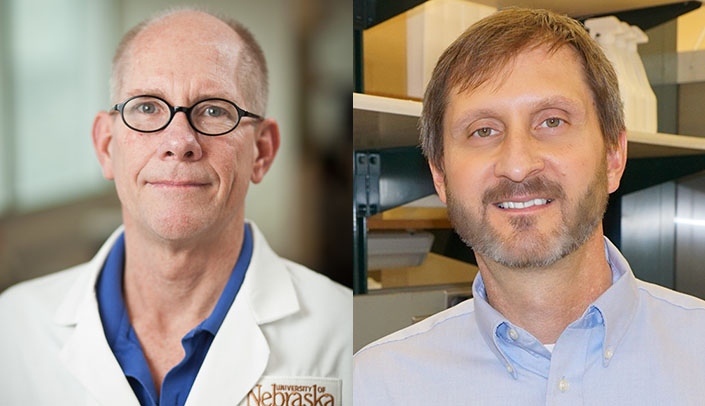UNMC is on a mission to wipe out pancreas cancer — perhaps the most lethal form of cancer.
As part of its assault on this cancer, which claims the lives of 90% of patients in less than a year, UNMC is taking a double-barrel approach that includes:
- A rapid autopsy program that features the most extensive and well documented collection of pancreatic cancer tissue deposits in the world; and
- A unique early detection program for people at increased risk of developing pancreas cancer. (See previous story in UNMC Today.)
UNMC receives more than $8.5 million in annual funding from the National Cancer Institute for its pancreatic cancer research, and this includes a prestigious Specialized Program of Research Excellence (SPORE) grant, which the NCI awards to only the most outstanding research programs.
As a key part of a research study that appeared in Nature on April 17, the UNMC Rapid Autopsy Program provided the Salk Institute for Biological Studies in La Jolla, Calif. with a unique sample set of untreated (no chemotherapy or radiation) donor specimens from the UNMC biorepository for pancreas cancer. These samples represented both the primary tumor from the pancreas and a liver metastasis from each patient, as well as serum isolated from donor blood.
The investigators utilized these samples in their study of how the leukemia inhibitory factor (LIF) is used as a factor in the communication between cancer cells and their surrounding environment and how targeting LIF has therapeutic potential and may serve as a circulating marker for response to treatment.
Rapid autopsy programs have tremendous potential, said Michael (Tony) Hollingsworth, Ph.D., professor in the Fred & Pamela Buffett Cancer Center, because they can show how a tumor unfolds over time at different disease sites. Dr. Hollingsworth and Judy Anderson were instrumental in starting UNMC’s Rapid Autopsy Program for Pancreas in 2002.
Over the past four years, the tumor donation program has provided project consultation to match archived samples with researcher and study needs, as well as donor tissues and sample analysis to UNMC investigators and other institutions for articles in some of the leading scientific journals — Cell, Cancer Cell, Nature Medicine and multiple articles in Nature.
The list of institutions seeking pancreas cancer tissue from UNMC includes some of the leading research universities in the country — MD Anderson, Mayo Clinic, Harvard, Stanford, Columbia, Cornell, and Michigan.
Over the past 17 years, the UNMC rapid autopsy team, which currently includes about 40 volunteers, has performed 127 autopsies. In recent years, the team has averaged between 10 to 14 autopsies per year, said Paul Grandgenett, Ph.D., director of the program.
“The donors and their families are what really drive this program, and that’s followed up with an incredibly strong volunteer base that we have at UNMC,” Dr. Grandgenett said. “The volunteers must be available within two to three hours of the person’s death. Sometimes that means coming in at 3 a.m. on the weekend. This commitment is a unique characteristic of our volunteers and is why we’ve become the premier rapid autopsy program for pancreas cancer in the world.”
Importantly, the volunteers also gain invaluable insight into the devastating effects of the disease, and this motivates them in their pursuit of helping future patients.
Dr. Hollingsworth said rapid autopsy is “essentially organ donation for cancer research — a way people can fight cancer after death. It is the biggest gift that people can give to further cancer research.”
The rapid autopsy team surgically removes all the organs in the donor’s torso/abdomen and flash freezes them in liquid nitrogen, Dr. Grandgenett said. These include the pancreas, liver, lungs, colon, spleen, diaphragm, adrenal glands and omentum. After the samples are archived, the body is returned to the requested funeral home within hours, allowing for open casket or other celebrations of life.
Understanding how tumors evolve and how they respond or fail to respond to treatment is critical to the advancement of cancer care, Dr. Grandgenett said. The findings from rapid autopsies can help gain insight into why a patient’s treatment did or didn’t work, he said. They provide investigators around the world full access to previously unavailable tissue samples.
“We can capture a complete staging of the disease, including the primary lesion, all metastatic sites and associated unaffected tissues,” Dr. Grandgenett said. “These are unique collections that provide a complete genetic and cellular history of disease evolution within the patient. Nebraskans can be proud of the pancreas rapid autopsy program and the impact it has had on global cancer research.”
Because of this success, Dr. Grandgenett said UNMC plans to develop rapid autopsy programs for three other cancer types — colon, prostate and lymphoma.
